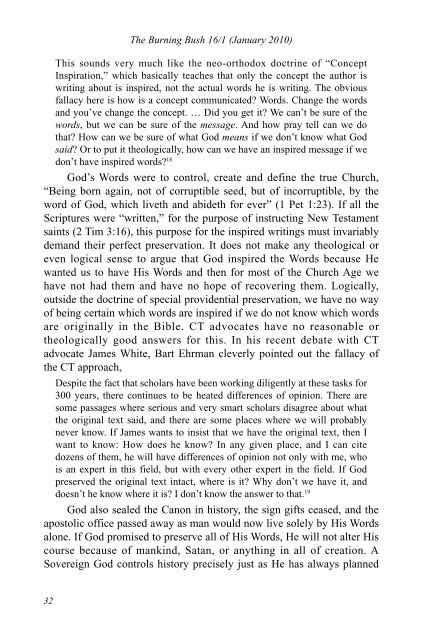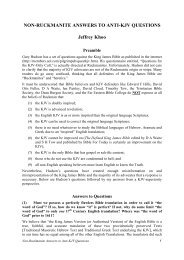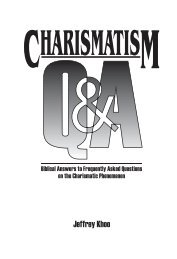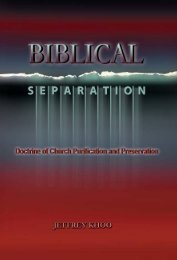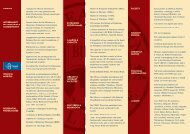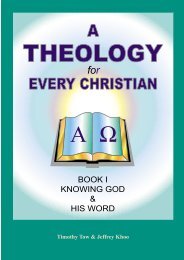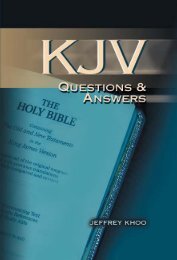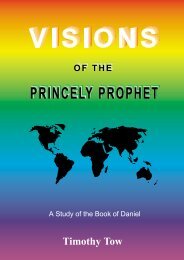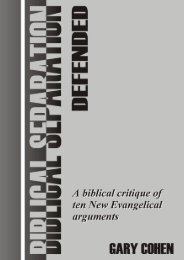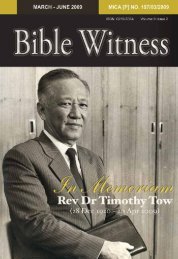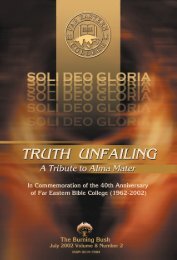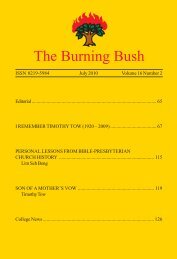The Burning Bush - Far Eastern Bible College
The Burning Bush - Far Eastern Bible College
The Burning Bush - Far Eastern Bible College
Create successful ePaper yourself
Turn your PDF publications into a flip-book with our unique Google optimized e-Paper software.
<strong>The</strong> <strong>Burning</strong> <strong>Bush</strong> 16/1 (January 2010)This sounds very much like the neo-orthodox doctrine of “ConceptInspiration,” which basically teaches that only the concept the author iswriting about is inspired, not the actual words he is writing. <strong>The</strong> obviousfallacy here is how is a concept communicated? Words. Change the wordsand you’ve change the concept. … Did you get it? We can’t be sure of thewords, but we can be sure of the message. And how pray tell can we dothat? How can we be sure of what God means if we don’t know what Godsaid? Or to put it theologically, how can we have an inspired message if wedon’t have inspired words? 18God’s Words were to control, create and define the true Church,“Being born again, not of corruptible seed, but of incorruptible, by theword of God, which liveth and abideth for ever” (1 Pet 1:23). If all theScriptures were “written,” for the purpose of instructing New Testamentsaints (2 Tim 3:16), this purpose for the inspired writings must invariablydemand their perfect preservation. It does not make any theological oreven logical sense to argue that God inspired the Words because Hewanted us to have His Words and then for most of the Church Age wehave not had them and have no hope of recovering them. Logically,outside the doctrine of special providential preservation, we have no wayof being certain which words are inspired if we do not know which wordsare originally in the <strong>Bible</strong>. CT advocates have no reasonable ortheologically good answers for this. In his recent debate with CTadvocate James White, Bart Ehrman cleverly pointed out the fallacy ofthe CT approach,Despite the fact that scholars have been working diligently at these tasks for300 years, there continues to be heated differences of opinion. <strong>The</strong>re aresome passages where serious and very smart scholars disagree about whatthe original text said, and there are some places where we will probablynever know. If James wants to insist that we have the original text, then Iwant to know: How does he know? In any given place, and I can citedozens of them, he will have differences of opinion not only with me, whois an expert in this field, but with every other expert in the field. If Godpreserved the original text intact, where is it? Why don’t we have it, anddoesn’t he know where it is? I don’t know the answer to that. 19God also sealed the Canon in history, the sign gifts ceased, and theapostolic office passed away as man would now live solely by His Wordsalone. If God promised to preserve all of His Words, He will not alter Hiscourse because of mankind, Satan, or anything in all of creation. ASovereign God controls history precisely just as He has always planned32


